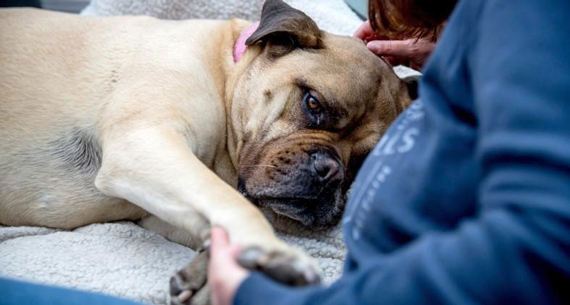
Dogs Trust has welcomed new Domestic Abuse Act guidance that formally recognises the impact it can have on pets.
The guidance recognises that control of a person’s financial situation, impacting their ability to care for a pet (limiting access to food and vet care for instance), constitutes economic abuse, a form of domestic abuse.
The charity says that through its a specialist pet fostering service for survivors of domestic abuse – the Freedom Project – it sees first-hand the various ways that perpetrators use dogs to coerce and control within abusive relationships.
When polled by Dogs Trust, almost 60% of professionals who work in the domestic abuse sector were aware of cases where pets, or an owner’s ability to care for a pet, had been impacted by financial abuse. Freedom Project clients describe the emotional turmoil and distress of having no choice but to watch a pet suffer untreated medical conditions or starving from lack of food.
On a daily basis, the charity also sees the negative welfare implications of economic abuse on the dogs they foster on the project, so it welcomes the recognition of these as examples of domestic abuse.
Amy Hyde, Dogs Trust outreach projects manager, said: “Every day we see the devastating impact that economic abuse has on the dogs that we foster, as well as the emotional distress that it causes their owners, so we are delighted that this type of behaviour involving pets has been included in the Domestic Abuse Act guidance. Often perpetrators will withhold funds for vital veterinary care or dog food, controlling every expenditure.
“We know that alongside economic abuse, dogs are also used to coerce and control emotionally – 97% of professionals working in the sector say this is the case. This can range from the physical abuse of the animal, through to repeatedly threatening to harm, kill or ‘get rid’ of the dog.
“We will continue to raise awareness of how dogs can also be used as tools in coercive control, physical and emotional abuse by perpetrators, to give voice to survivors and their pets.”
A domestic abuse survivor who accessed the Freedom Project said: “My ex-partner would say there was no money left at the end of the month, which I believed at the time.
“I was always made to feel it was my fault that we had no money. My mum would pay for the dog food so that they didn’t go without. I fed them on an expensive brand and I was frightened to let him know how much the food was in case he got rid of the dogs or made me feed them poor quality food.”
Pets can be a major factor in people not being able to escape domestic abuse, for fear of what may happen to their beloved companions if they’re left behind. Many refuges are unable to accept animals, so the Freedom Project offers dog owners a vital lifeline to escape abuse. The service provides foster homes for dogs, covering all the necessary expenditures and enabling survivors to access safe accommodation, in the knowledge that their dogs will also be safe. The project needs foster carers to support this vital service.
Since its inception, the Freedom Project has supported around 1,750 people fleeing domestic abuse and the service’s fosterers have cared for over 1,900 dogs.


